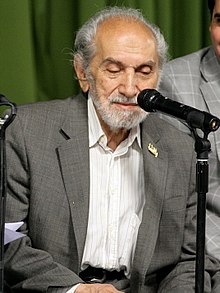| Habibollah Chaichian | |
|---|---|
 | |
| Native name | حبیبالله چایچیان |
| Born | 1923 Tabriz |
| Died | 30 November 2017(2017-11-30) (aged 93–94) Tehran |
| Resting place | Behesht Zahra, Tehran |
| Occupation | Poet |
| Language | Persian |
| Genre | Religious poem |
| Years active | 1938 – 2017 |
| Notable works | "Emshab Shahadatnameh Oshagh Emza Mi-shavad" and "Amadam ey Shaah Panaham Bedeh" |
Habibollah Chaichian (Persian: حبیبالله چایچیان) (1923 – 30 November 2017) was an Iranian prominent poet known for religious and ritual poem.
Pen name and selected work
His pen name (pseudonym) was Hesan (Persian: حسان) adopted from the name of a Sahabah in Islam. His favorite poetic form was Do-baytī but he had works in other Persian poetic forms including Mathnawi.
Chaichian had religious poem in Persian language with Arabic additives, in which several of them became significantly widespread in religious ceremonies in Iran and few other Persian-speaking countries. Two of his most well-known poems begin with the Matla: "Emshab Shahadatnameh Oshagh Emza Mi-shavad" (tonight, martyr merit-letter of God-lovers are being signed) for Imam Hossein and "Amadam ey Shaah Panaham Bedeh" (Here I have arrived your majesty, grant me asylum) for Imam Reza.
Death and funeral
He died on Thursday 30 November 2017 at age 94 at Tehran's Shohaday-e Tajrish Hospital. His funeral began from the same hospital on the same day, and he was then buried in Tehran's major cemetery Behesht Zahra.
Family members and friends and also public figures such as son of Iran's leader and Alireza Marandi attended the funeral procession.
Upon Chaichian's demise, several public figures and politicians in Iran sent condolence messages, including Supreme Leader Ali Khamenei ، Ali Larijani speaker of the Majlis (parliament), Abbas Salehi (Ministry of Culture) and Mohammad Ali Najafi (Tehran's Mayor).
References
- "حبیبالله چایچیان درگذشت". تسنیم. Retrieved 1 December 2017.
- ^ "Poet Habibollah Chaichian dies at 94". Tehran Times. 1 December 2017. Retrieved 1 December 2017.
- "حبیبالله چایچیان درگذشت/ وداع با شاعر "آمدم ای شاه پناهم بده"". خبرگزاری مهر | اخبار ایران و جهان | Mehr News Agency (in Persian). 30 November 2017. Retrieved 1 December 2017.
- "Funeral procession for Habibollah Chaichian". Tasnimnews. Tasnimnews agency. Retrieved 1 December 2017.
- "پیام تسلیت در پی درگذشت مرحوم چایچیان (حسان)". Khamenei.ir. 2 December 2017. Archived from the original on 3 December 2017. Retrieved 2 December 2017.
- "پیام تسلیت مقام معظم رهبری برای درگذشت مرحوم حبیبالله چایچیان". ILNA. Retrieved 2 December 2017.
- SNN.IR, خبرگزاری دانشجو. "پیام تسلیت رئیس مجلس به مناسبت درگذشت حبیبالله چایچیان". خبرگزاری دانشجو | SNN.IR (in Persian). Retrieved 2 December 2017.
- "Salehi's message for the death of Habibollah Chaichian". Iranian Labor News Agency (ILNA). Retrieved 1 December 2017.
- "Najafi message for Chaichian's demise". Hamshahrionline.ir. Retrieved 1 December 2017.